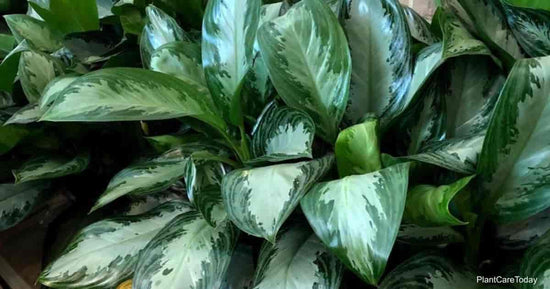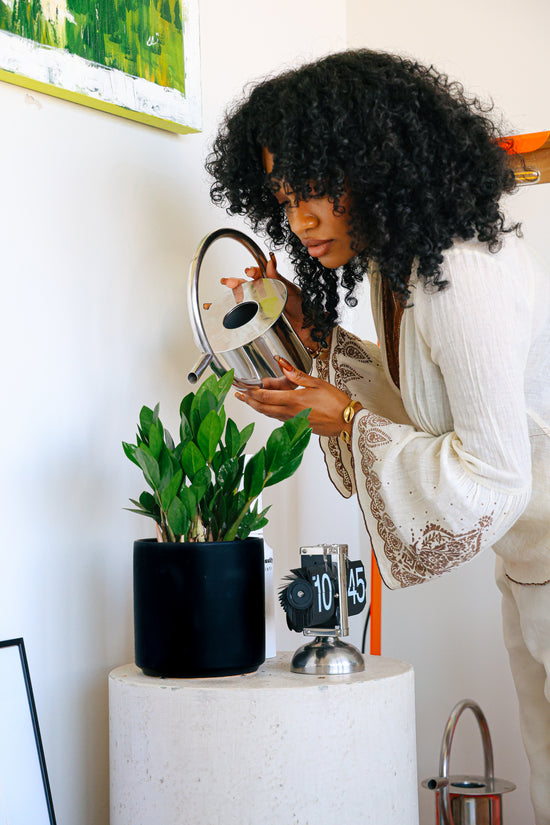As plant people, we understand what it’s like to obsess over a plant, perhaps even being overzealous with its care. Less tends to be more when it comes to houseplants, and you’ll want to find a balance between letting them breathe and grow. To grow healthy plants, know their needs and avoid common mistakes with watering, nursing plants to health, fertilizing, and pruning.
OVERWATERING YOUR PLANTS
Arguably the #1 mistake made by attentive plant caretakers is overwatering. Did you know that how often you water your plants depends on five things? The plant type, pot size, season, drainage, and environment all factor into how frequently your plants need water.
Before you worry that your plant is not getting enough water, assess the soil moisture and know exactly what the plant needs. Here are some tips to fully understand watering your specific plants:
- Preference - Know what kind of moisture this plant likes. Moist, semi-moist, or dry?
- Size - Smaller pots dry out faster than larger ones because more soil absorbs more water.
- Season - Remember that plants need water less often during fall and winter.
- Drainage - Soil that is tightly packed and pots without a drainage hole will dry slower.
- Environment - A warm, bright environment encourages quick drying compared to a dim, cool environment. Air circulation in your home plays an important role as well.
When in doubt, check out our plant-specific Care Guides and confirm the soil moisture with your finger or a meter.
FUSSING OVER THEM WHEN THEY’RE STRESSED
If you see some early signs of stress on your plant, we recommend troubleshooting the cause immediately. Some issues need prompt attention while others are less worrisome or even normal. Resist the urge to make changes and corrections all at once, as this may end up causing more stress. Start with assessing its watering routine, environment, and lighting + steer away from:
- Moving a stressed plant to a new area; unless its current temperature or lighting is wrong.
- Repotting a plant while it’s stressed. For cases of root rot, poor drainage, or root-bound plants, potting may be necessary.
- Giving up on a struggling plant that still has healthy green growth! It can be propagated or might even make a comeback with time.
If your plant is drooping, losing leaves, or turning yellow, start by reviewing its preferred environment and needs. If something is lacking or newly changed in its routine, it just needs care and time to adjust. Rest is essential for recovery.
FERTILIZING BEFORE THEY’RE READY
If you’re an eager fertilizer hoping for abundant growth, you may be causing more harm than help. Fertilizing requires plants to use a lot of energy to push out new growth. If not done carefully, treatments can be disruptive. Here are a few things to keep in mind when fertilizing:
- Do not fertilize houseplants during fall and winter. This is a crucial time for plants to rest.
- Allow six weeks of rest time between potting and fertilizing. Doing both too soon will cause stress and even damage to the plant.
- Fertilizing too often or too heavily can harm and even “burn” your plant. Always be sure to dilute your fertilizer treatments and spread them out 2-4 weeks at a time during spring and summer. When using store-bought fertilizers, carefully follow the package instructions.
PRUNING TOO MUCH, TOO OFTEN
We all love to see near-perfect green leaves and healthy stems on our plants. However, blemishes are natural and can also be a useful communication tool. If you prefer to prune away cosmetic changes such as brown tips and yellow leaves, use caution to never remove more than 10-20% of a plant at a time. Removing too much foliage or removing it too often will send the plant into shock, stunting its growth or even killing it.
A useful rule of thumb is to schedule your heaviest pruning for early spring and early fall. If you’re simply pruning away unfavorable blemishes, do it lightly and carefully throughout the year, being sure to remove as little as possible.
We love to talk care questions with our community! If you have any questions, get on our calendar for a free 1-on-1 Plant Care call with our Plant Specialist.





